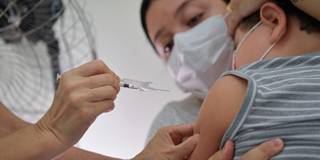After significant advocacy by poorer countries and civil society, the G20’s pandemic-preparedness fund is being designed to embody a more equitable and balanced governance model. But without adequate funding and much larger additional investments in health systems, the new fund will become just another burdensome distraction.
LONDON – The pandemic is not over. While the summer of 2022 is very different from the summer of 2020, because we now have vaccines, treatments, and a better understanding of the virus, it’s not enough. Every week, 15,000 people still die from COVID-19. Poorer countries still struggle to deploy vaccines, tests, diagnostics, and other tools. And countries at all income levels remain woefully unprepared for the next pandemic, even though experts warn that its arrival is a matter of “when,” not “if.”

LONDON – The pandemic is not over. While the summer of 2022 is very different from the summer of 2020, because we now have vaccines, treatments, and a better understanding of the virus, it’s not enough. Every week, 15,000 people still die from COVID-19. Poorer countries still struggle to deploy vaccines, tests, diagnostics, and other tools. And countries at all income levels remain woefully unprepared for the next pandemic, even though experts warn that its arrival is a matter of “when,” not “if.”